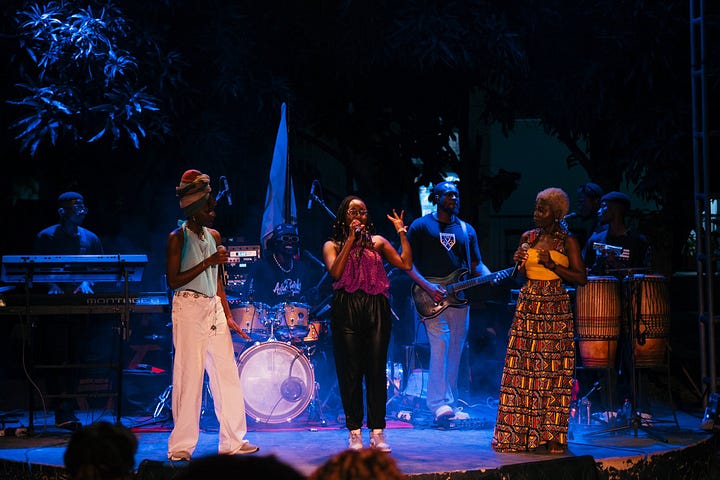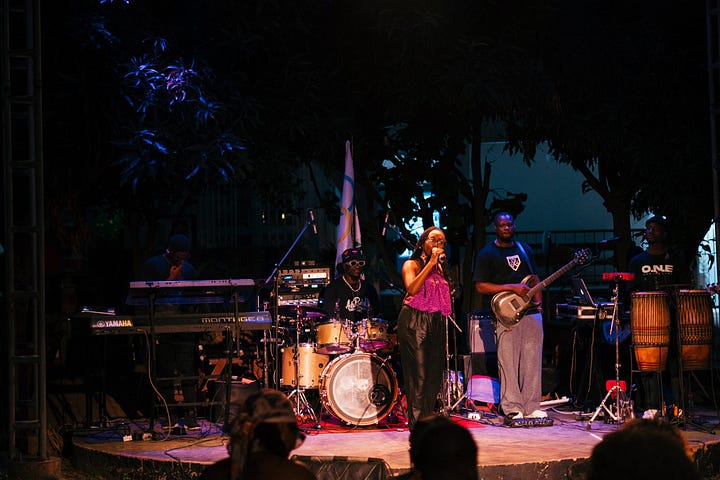On Following Someone Else's Lead 🕸️ Issue 12
(Hint: It’s Easy, Don’t Lose It.) The trials, breakthroughs, and moments of surprising ease in creating a collaborative album.
Before we begin, an ode to growth. It I have outgrown that phenomenon which is common to many fledgling recording artists: hating the sound of one’s own voice. When my first EP, Solitaire, first came out, I would cringe each time I heard my voice played back. Today, I can listen to tracks featuring me on repeat because I am genuinely in love with the art I have helped to make. Praise the Lord, can I get a Hallelujah?!
Now, on to the theme of this issue: following another artist’s lead.
The Context: Koshka 2024
A spider has about as many legs as The Spider Kid has creative profiles: prose writer, performance poet, screenwriter, songwriter, recording artist. The recording artist in me was a member of the Black Girls Glow sound residency this year—the first one to be dubbed Koshka, even though the program has been running for seven years. Over the span of nine days in July 2024, seven African women—myself included—gathered in a villa to bond, to learn, and to create a sound project. Out of those nine days, we had two and a half to start and finish our album, which is out now everywhere: Don’t Lose It.
Stream on Spotify. Stream on Apple Music.
There’s an evidence-based stereotype about creative people being generally proud and egoistic. In many respects, I am no exception. I call myself a “remixer”—someone who re-creates from information, content and art that I glean from other creators. But I usually get to choose what I’m remixing. Not so with Koshka; for much of the residency, I was assigned by BGG/Koshka staff—to teams, to instrumentals, to tracks that other members of my cohort had started. It pushed me far out of my comfort zone, and the collaborative process was full of trials, breakthroughs, and moments of surprising ease.
The Process
My trials began as soon as the actual album creation process did. As a cohort, we gathered in a room to listen on loudspeakers to a playlist of bare-bones instrumentals. We had been divided into initial groupings of two pairs and a trio to accommodate our odd number of seven. Each cluster was meant to select one instrumental to start composing to in their pair or trio.
The idea was, even if a duo/trio other than yours selected an instrumental you were interested in, you would get a chance later to hop on it after they had laid down the foundations. Given what little time we had, I wasn’t hopeful that things would work out so smoothly, and was eager to snatch the instrumentals that inspired me the most, right off the bat.
Naturally, it happened that the instrumental that appealed the most to me was not as interesting to the two other members of my first grouping. Outvoted in my trio, I acquiesced to their selection and watched in barely disguised pain and jealousy as the track I wanted to pick was selected by a different duo. Spoiler alert: that instrumental came back in my direction, and I killed it! You know what they say about what is meant for you…
The Stress and the Key to Breakthrough
Creating with my first trio was so much more stressful than I anticipated. Attempts to compose as a group yielded fragile results. We soon diverted into trying to compose independently and then presenting to the others what we had so far. I am a very beat-oriented person, and without a solid drum pattern to show me the way on our selected instrumental, I floundered. (I had experienced similar struggles with a track DJ Yamz had me featured on: U 4 Smoke Well.) Left to myself, I would never have chosen to start with this instrumental. Internally, I saw red for 2.5 seconds when one or both of my trio mates confessed that, now that we were working with this instrumental, they didn’t like it as much as they thought they did during the first listen. As for me, I hadn’t been a big fan of it before, a few minutes into attempting to compose to it, I started to detest it.
The theme and lyrics posed their own challenges. I admit I am not entirely immune to the trappings of cliché. I mean, I have a background in the artform for which the 22 Jump Street parody, “Cynthia! Cyn-thi-a! Jesus died for our sin-thi-as!” bears too much resemblance to lines I’ve heard from real performers who were not trying to be funny. But some lyrics and themes do feel to me like fast food—catchy soundbites, easily digestible—and they do not sit well with me as a prose writer, or even a poet. Some lines which gave me such vibes came easily to one of my partners and made me want to run far, far away from the track. My body and mind resisted her creative direction and I continued with my private compositions, in my own style.
Later, when my trio presented to staff and were told in diplomatic words that what we had so far was too disjointed for a cohesive song, I couldn’t be surprised, but my stress intensified. I yearned to be reassigned to work on a song I could actually connect with, but instead, we were told to go and try to make something better out of what we already had. At some point, I went off on my own and shed some tears from the stress of it all. I know that every member of my trio had a private waterworks moment while we worked on this song. I’m pretty sure it took the longest to tighten, of all the songs on the album.
The most irritating part for me was that I was not creating what I wanted to create. First, I had felt pressure to defer to my partners’ choice of an instrumental, and now I felt pressured to reorient my writing towards a theme one of my partners was so comfortable with that I could not imagine her being swayed from it. The only way out was through. I had to follow her lead.
The thing that carried me through this initially excruciating process was conversation. I asked this partner plainly what the lyrics and the theme she had laid down so far meant to her, and the story she told us was so profound that it forced an empathetic shift in perspective. Now it felt to me like there was weight behind content that once felt to me like air, a concentration of valuable nutrients behind lyrics that once sounded to me like fast food. This made it significantly easier to follow my partner’s lead in the direction of the final song and was a valuable lesson for me in the art of collaboration.
I’ll leave you to guess which track I’m referring to here. Meanwhile, here is a song I had nothing to do with and which I love very much:
The Ease That Followed
Most of the other tracks I featured on were much easier to create to, because from that point, I was assigned to tracks by less arbitrary means: based on my skill set and prior discography. Naturally, I created the most easily to the tracks that I myself laid the foundations for, because I got to determine their direction, and my ego faced minimal discomfort. For the rest of the residency, every collaboration I was involved in was only mildly challenging; there were no more tears, there was no more visceral resistance from my body.
The Pleasant Surprises
As far as notable experiences from following someone else’s lead, there are two more tracks that deserve special mentions:
Our World, Our War
As soon as I heard the instrumentals for this track, I could imagine Dumama on it. She is one of the most interesting, most incredibly talented sound artists I have ever encountered. The vastness of her creativity and imagination are astonishing, as are the quality of her speaking and singing voice, the natural poetry of her lyrics, and the weird and wild manipulations she is capable of with her loop station. So, when I was eventually assigned to add on to what Dumama had begun on this track, I was excited but also a little intimidated—not by her, but by the limits of my own creative range. And yet, it was a challenge I was happy to rise to.
The result was that I got to be featured on the most left-of-pop song I’ve ever had the pleasure of gracing. It’s a track that feels to me like science-fiction or speculative poetry, full of vocal manipulation and seemingly simple lyrics that carry worlds within them. I cannot believe there is a song out in the world for which I got to speak the lyrics, “FutureHuman family unearthing”. I mean, how cool is that? I want to use that phrase for something else one day.
Easy, Don’t Let It Go
Darlings, there must be crack in this song. I have not been able to stop playing it since our Koshka24 cohort’s private listening session, before the album even came out. I fear I am responsible for at least half of the streams on this song, even though I’m one of its featured artists.
This was the one instrumental which, when played for us at the beginning of the album creation process, was an instant hit. Nearly every woman in the room could vibe to it, wanted to write to it, but of course, we couldn’t all start at once. Someone—or two, or three—had to lay down the foundations while others got started on other tracks, or we’d never be able to finish the album on time.
I hate to say it, but by the time the first group presented what they’d done so far on this track, I was stunned and confused. It was worlds apart from what I’d privately envisioned for the song, from its energy to its melodies to its lyrics. In fact, I wanted to begin again from scratch with the skeleton track, intrigued by the idea of two different songs on the final album based on the same instrumentals. But there was no time.
Because all of us had liked the instrumental initially, it was agreed that all of us should have a verse on this song. Given how I felt about what I’d heard from the first group so far, I was even more surprised at how easy it was to follow their lead in writing my own verse. I didn’t even need an isolated writing session; I composed to it in the chaos of announcements, rehearsals, engineering, and recording ensuing simultaneously in our makeshift studio.
The final product, with all seven of us featured, is—in my opinion—pure magic. ✨
In related matters, if you did not attend the Koshka 2024 Concert, it is your very big loss. Talk about a 10/10 concert! Every single performance was stunning, and believe me, I am not one to subscribe to Accra “packaging”, so I truly mean what I say. Besides performing tracks from the then-unreleased Don’t Lose It album, each artist got to perform some of her own songs as well. One of my personal performances was Heroes, my last single, with the assistance of my Koshka24 roommates, UZÉI and Traygan. We got a standing ovation—and probably deserved it, too!


By the way, there’s an entire mini documentary (15 mins) about the Koshka24 residency, free to watch on YouTube!
Anyway, see you in the next issue, Spinnerettis! I’ve got some things I’m excited to share, coming very soon.
🕸️, Akotowaa.








